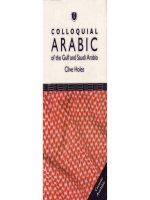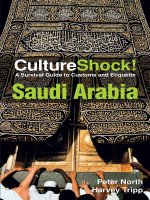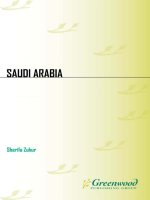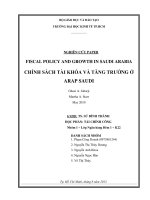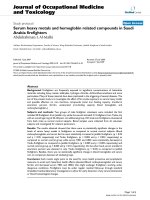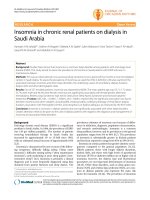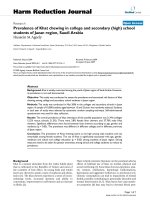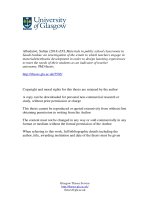efl materials in public school classrooms in saudi arabia
Bạn đang xem bản rút gọn của tài liệu. Xem và tải ngay bản đầy đủ của tài liệu tại đây (7.62 MB, 275 trang )
Glasgow Theses Service
Albedaiwi, Sultan (2014) EFL Materials in public school classrooms in
Saudi Arabia: an investigation of the extent to which teachers engage in
materials/textbooks development in order to design learning experiences
to meet the needs of their students as an indicator of teacher
autonomy. PhD thesis.
Copyright and moral rights for this thesis are retained by the author
A copy can be downloaded for personal non-commercial research or
study, without prior permission or charge
This thesis cannot be reproduced or quoted extensively from without first
obtaining permission in writing from the Author
The content must not be changed in any way or sold commercially in any
format or medium without the formal permission of the Author
When referring to this work, full bibliographic details including the
author, title, awarding institution and date of the thesis must be given
1
EFL Materials in public school classrooms in Saudi Arabia.
An investigation of the extent to which teachers engage in
materials/textbooks development in order to design learning
experiences to meet the needs of their studentsas an indicator of
teacher autonomy.
By
Sultan Abdulaziz Albedaiwi
A Thesis Submitted in Fulfilment of the Requirements for
the Degree of Doctorate of Philosophy in Curriculum
Studies
(Policy, Pedagogy and Practice Group)
Supervised by
Professor Vivienne Baumfield (Principal)
Dr. Brian Templeton (Second)
August 2011
2
Abstract
The study explores the different responses of the teachers in the study to
the policy of the Ministry of Education regarding the use of the prescribed textbook
and the extent to which through their use, design and evaluation of teaching materials,
teachers are able to enhance their professionalism.
-
The hybrid approach
adopted for this study proved useful in uncovering much rich information about
teachers’ perceptions about and use of the textbook and the implications of the extent
to which they engaged in materials development in response to the needs of their
students. The study revealed different perceptions and degrees of responsiveness to
the need to adapt materials for the learners in the classroom. In some instances, whilst
teachers described themselves as exercising autonomy the observation of classroom
practice was not entirely consistent with such a perception. Conversely, some teachers
were more proactive in the classroom than responses in interviews might suggest.
The study builds on previous work into the trend for learners in EFL classrooms in
Saudi Arabia to exercise more learner autonomy and the relationship between learner
demands, the capacity of teachers to engage in materials development and teacher
professionalism is examined. The study concludes that more research into providing
scope for adaptation and variation in the use of textbooks in EFL in classrooms in
Saudi Arabia could shed light on how institutional and personal constraints on teacher
autonomy could be mediated without jeopardising the quality and consistency of
learning and teaching.
3
Abstract 2
Tables and Graphs: 7
Acknowledgments 8
Author’s declaration 9
Appreviations: 10
Key Words: 10
Chapter 1 11
Introduction 11
1-1 Statement of the problem 11
1-2 Theoretical Framework 13
1-3 Saudi EFL Teachers and exercising autonomy? 15
1-4 The purpose of the study 17
1-5 The aim of the research 19
1-6 The research questions 19
1-7 Thesis summary 20
Chapter 2 21
The Study Setting: Kingdom of Saudi Arabia (KSA) 21
2-1 EFL TEACHING IN KSA: HISTORICAL AND OVERVIEW 21
2-1-1 Tatweer Project 22
2-1-2 Assessment in the Saudi education system 24
2-2 EFL textbooks and pedagogy in Saudi context 25
2-3 CURRICULUM DEVELOPMENT AND TEACHER PREPARATION IN KSA 32
2-3-1 Teacher Training 34
Chapter 3 36
Literature review 36
3.1 Introduction 36
3.2 Characteristics of effective EFL teaching- learning 36
3-2-1 Range of pedagogies within EFL 37
A- The grammar- translation method (GTM) 37
B- The Audio Lingual Method – (ALM) 39
C- Communicative Language Teaching (CLT) 41
4
3-2-2 Studies intended for other contexts 43
3.3 The role of textbooks in effective teaching and learning of EFL 46
3.4 Introducing the term ‘teaching materials’ 48
3-4-1 The teacher perspective of material development 48
3.5 Teachers’ professionalism and professional development 57
3.6 Teacher professionalism and teacher autonomy 60
3.7 Are teachers considered professionals? 67
3.8 Teachers’ professionalism, material innovation and autonomy 72
3-8-1 Teacher self-efficacy 74
3.9 Textbooks, materials development and Huang’s framework for teacher
autonomy: some final remarks 75
Chapter 4 80
Methodology 80
4-1 Overview 80
4-3 Participants’ recruitment (Interviews & observations) 81
4-4 Methods 84
4-4-1 Interviews 84
4-4-1-1 Limitations of the Interviews 86
4-4-2 Observation 87
4-4-3 Limitations of observations 89
4.4.4 Triangulation 90
4-5 Data analysis 91
4-5-1 Narrative approach 92
4-5-2 Grounded Theory Approach 93
4-6 Methodology Timeline 95
4-6-1 Pilot Study 95
4.6.2 Main Field work 98
4.6.3 The follow up and revisiting data collection 99
4-6 Summary 100
Chapter 5 101
Findings & results 101
5-1 Overview 101
5-2 Data analysis 102
5-2-1 Interviews & Observations 103
5
5-2-1-1 Narrative approach 103
5-2-1-2 Grounded Theory approach 169
Teachers development and materials reform 169
I. The significance of being part of the EFL materials development: 170
II. Views of the appropriate procedure to be involved in such development: 173
III. Enhanced teacher skills after being involved in the materials development. 177
IV. Teachers’ Encouragement and its relation to materials 181
2) Teachers exercising autonomy 187
I. The significance of being an autonomous teacher. 187
II. Teachers engaging in materials development and its relation to exercising
autonomy 193
5-2-1-3 Observations 201
I. Use of textbooks/Materials: 202
II. Matches learning activities to meet the textbook/Material: 202
III. Response to individual learners: 202
IV. Use a range of teaching and learning techniques to engage and motivate learners
and encourage their autonomy: 204
V. Encourage learners to use their own life experiences as a foundation for their
development: 204
VI. Teacher makes a decision to change what they are doing during the lesson/
departs from the lesson plan in the textbook/Material: 205
A) Teachers’ exercise level of autonomy: 205
5-3 Summary 207
Chapter 6 208
Discussion 208
6-1 Overview 208
6-2 The Saudi context 210
6-3 The levels at which teachers exercise autonomy & the development of
materials 211
6-4 Teacher training, knowledge & the development of materials 213
6-5 Constraints against teachers’ practice of autonomy 216
6-6 Teacher development and external pressures 219
6-6-1 the Saudi education policy 219
6-6-2 Teachers’ educational and social beliefs 221
6-7 Alternative methods applied by teachers 222
6-8 Approaches to pedagogy and the concept of exercising autonomy 223
6-9 Teachers exercise of autonomy and the textbook 226
6
6-10 Summary 228
Chapter 7 229
Conclusion 229
7-1 Overview 229
7-2 Main Theme 230
7-3 The analysis 233
7-4 Recommendations 234
7-4-1 Teacher training and professional development 234
7-4-2 Teaching materials and their professional evaluation 235
7-4-3 Shared coordination of materials development 236
7-4-4 Adoption of the experienced EFL teachers’ views and knowledge 238
7-5 The limitations of the study 238
7-5-1 Number of interviews and classroom observations 238
7-5-2 Lack of research resources on the topic 238
7-5-3 The participant teachers’ genders 239
7-6 Suggestions for Further Research 239
7-6-1 Suggestions for the literature 239
7-6-2 Suggestions to be extended after this study 240
References: 242
Appendixes: 267
7
Tables and Graphs:
Table1 Methodology plan shows the methods used and a timeline of the research
phases.
Table 2:
Graph 1
Graph 2: Example of how narrative and grounded theory approaches are blended.
Graph 3:
Graph 4:
Graph 5:
8
Acknowledgments
As is the case in most human productions, this thesis was the result of the collective
efforts of a number of important and valued people who directly or indirectly assisted
and supported me during my PhD degree programme. To these people, I owe my
gratitude.
Special thanks are due to my supervisor Prof. Vivienne Baumfield, for her guidance,
patience, and time. My appreciation is also expressed to my Second supervisor Dr.
Brian Templeton who put his effort to advise me through many meetings and provided
me with invaluable ideas.
Thanks to the Ethics Committee in the University of Glasgow, for their time and effort
in providing the suitable structure and requirements, to apply my research tools using
proper instructions.
Finally, my special gratitude is due to my wife and daughter, who encouraged, prayed,
inspired and support me through the years of my scholarship and helped live those
years with ease as possible.
9
Author’s declaration
I declare that, except where explicit reference is made to the
contribution of others, that this dissertation is the result of my own
work and has not been submitted for any other degree at the
University of Glasgow or any other institution.
Signature:
Printed name ______Sultan A. Albedaiwi______
10
Appreviations:
1. KSA: Kingdom of Saudi Arabia.
2. MOE: Ministry of Education.
3. GDA: General Directorate of Assessment.
4. EFSA: English For Saudi Arabia.
5. EFL: English as Foreign Language.
6. TEFL: Teaching English as Foreign Language.
Key Words:
Textbooks, Materials development, Teacher professionalism, Teacher
autonomy.
11
EFL Materials in public school classrooms in Saudi Arabia.
An investigation of the extent to which teachers engage in
materials/textbooks development in order to design learning
experiences to meet the needs of their studentsas an indicator of
teacher autonomy
Chapter 1
Introduction
1-1 Statement of the problem
English for Saudi Arabia (EFSA) is the only textbook the Ministry of Education
(MoEAdminstration, 2010) has provided for teaching English since 1992. Therefore,
it constitutes the sole, official guidance on English teaching and controls the way
teachers teach English by shaping their experience, and sets parameters for the
approach to be used, the skills required and limits the scope for teachers to exercise
personal creativity in the planning of learning experiences for their students. It is
argued that the constraints imposed by the MoE textbook prevents teachers from
recognising the difference among students (Al-Sadan, 2000) and discourages them
from developing approaches that meet the needs of the students in their classes.
Recently, the MoE has been working with publishers to introduce new textbooks but
this has been without any involvement of teachers and the potential value of their
input into the development of teaching materials and the evaluation of teaching
approaches remains unrecognised. All that both teachers and students are expected to
do is to follow what has been prescribed.
Regulation of all public education forums in KSA, (MoEAdminstration, 2010)
stresses that teachers must duly complete teaching of all the unit content provided in
the textbooks provided by the MoE:
Due to what has been noticed in the educational field in schools that there are some
delays by some teachers in finishing the planned courses of the textbook, the ministry
hereby stresses that such delay would impair the overall goals of the material and
12
affects the level of cognitive achievement (cumulative) for students’ sequential stages
of education, which is the educational policy overall aim in public schools in Saudi
Arabia (MoEAdminstration, 2010). (see Appendix 1, Arabic text)
This is just one example of the demands of the MoE on teachers, which requires them
to complete the whole content of textbooks in their courses (see also(Council, 2000).
Therefore, teachers are faced with a struggle to complete the units prescribed by the
MoE in the textbooks and cannot find time to develop additional materials to teach
concepts that their students find hard to understand or which the textbook simply does
not explain.
Moreover, if a school wishes to make a change in the curriculum (such as using a
different or a supplementary textbook) the change must be approved by the Ministry,
which has several sub-offices in each of the five provinces and this is a time
consuming process and it is not encouraged. So, although a province with the
approval of the MoE could make changes or amend a non-basic rules, such as
classroom testing strategies, Saudi education is standardised in the government’s
public schools. The schools all have the same curriculum and use the set textbook
distributed countrywide by the MoE (Alabdelwahab, 2002).
According to Al-Roumi (2012), the vice minister of education for planning and
development, the ministry does not give any permission to the efforts of an individual
teacher to modify the units or lessons provided in the textbook, or add an extra page
to the book, or even alter any of its specifications, or divide it into parts. This
restriction on the teacher to design material and activities can have detrimental
consequences for their students.
Al-Roumi continued declaring that such view of protecting textbooks from any
amendments agrees with the view of the General Directorate of Curricula, which
leads the project to develop curricula and textbooks that can reach international
standards. They appear to want to devise a ‘teacher-proof’ textbook in terms of
controlling content, design, and accompanying educational materials, to take account
of all the requirements of all the students who will then need only to practice the tasks
in the textbooks correctly (Al-Roumi, 2012).
13
Furthermore, the circulated new policy, according to Al-Roumi (2012), stressed the
need to maintain the textbooks and courses in the image and specifications without
any change, alteration or deletion, as they have already been quality assured prior to
publication; the assumption being that any changes made by teachers in the classroom
would diminish rather than enhance the quality of the learners’ experience.
The vision for the learner, the school and the district in contemporary KSA depends
on redefining the role of the Ministry of Education. Under this new vision, the
Ministry of Education will focus mostly on policy-making, development of standards,
development of curricula, provision of high quality teaching and administrative staff,
and provision of resources and tools to Districts and schools (Tatweer, 2008-2012).
Tatweer is King Abdullah Bin Abdul Aziz Public Education Development Project that
will radically alter the current Saudi education model bringing it in line with the
highest international standards (Saudi Gazette, 2011).
According to the Alweaam online newsletter (Alweeam, 2012), the Tatweer project
involves the production of curricula from the developed world that can be transferred
into the local environment of the Kingdom of Saudi Arabia, as well as designing
quality training packages and global programmes that are modern and internationally
accredited for teachers who teach English as a foreign language (EFL).
However, the implication of the Tatweer strategy for EFL, and for this study, is that
none of their plans, as indicated previously, include the knowledge and experience of
the EFL teachers themselves who are excluded from material development and
constrained from adapting tasks to meet the needs of their learners. It would appear
that this strategy is simply the continuation of a long history of amendments, which
now seems to have reached the peak of their development without any involvement of
teachers in the process.
1-2 Theoretical Framework
According to Barfield et al. (2001), teaching is always context–orientated and the
professionalism of teachers is directly linked to their ability to adopt and adapt
approaches that can meet the needs of their particular classes and individual students.
14
Teachers need to be able to exercise a degree of autonomy in order to reflect upon the
features of their specific teaching environment and be willing and able to learn from
their experiences for the promotion of effective responses to learner needs.
Current thinking explores the extent to which a teacher develops a greater/lesser sense
of autonomy through their capacity to respond to the needs expressed by students and
whether this contributes to more effective learning (La Ganza, 2008, Lamb, 2008).
The role of teachers in curriculum development is an important indicator of the
extent to which they are considered to have a professional enough status to be trusted
in the modification of content and modes of. Stenhouse (1975) argues that curriculum
development is a central component of teachers’ professionalism as they are the
experts on how to promote learning in their classroom.
However, in this thesis I was is exploring
on the teachers’ role in the development of materials to
support learning in the EFL classrooms. To what extent do the teachers in the study
have the scope to deal with students’ eagerness and enthusiasm, if any, and can this
help teachers develop their skills and professionalism? Bell and Gower (2011) have
stressed the importance for teachers to adapt already provided materials, if they are to
be adaptive to the students’ context and needs.
A teaching approach that is student-centred should be able to allow for further
modifications of the curriculum to fit different students and learning environments
during the teaching process and the implementation of its materials (Galton, 1998).
This can be further supported by the fact that curriculum development does not only
rely on curriculum creation, but all the processes and stages involved in its classroom
implementation (Varış, 1997).
The previous studies suggest that teachers who tackle their teaching work using the
student-centred approach need to be given the choice of freedom to understand and
interpret the current textbooks in their own ways and in the ways they think are best
suited for their students.
15
For example, teaching in Saudi Arabian regions can be very demanding in terms of
more responsibility and limited choices, since the teaching methods used in teaching
English do not allow for the use of a student-centred approach and instead use the
traditional teacher-centred approach (Grami, 2012).
Challenges that teachers face in this region, related to teaching English, are those that
arise due to cultural differences and some educational factors that help shape the
curriculum of the area (Gray, 2000, McKay, 1992, Whitfield and Pollard, 1998).
Other factors that influence English learning in Saudi are the processes that the
national government have put down for recruiting new English teachers, processes
which do not, in any way, prepare the newly recruited teachers for the tasks that lay
ahead (Al-Hazmi, 2003).
For these reasons, Saudi students are always left behind in learning the language and
are therefore not able to relate classwork with what happens in real life environments
(Syed, 2003). Due to this, it is always difficult for them to pass language tests like
TOEFL and IELTS.
There are many researchers who, in the past, and still do, stress the need for balance
between teachers exercising autonomy and overall responsibility, which would allow
for proper functioning of various school activities (Anderson, 1987, Gutmann, 1999).
However, other researchers stress that exercising autonomy should not be used as an
excuse to demand professional freedom, as this will reduce teacher cooperation with
their fellow workmates in schools and the entire school management, and make them
remain in professional isolation (Little, 1990, Pearson and Moomaw, 2005). The
effect of this, according to the researchers, is reduced performance amongst teachers,
which does not promote the curriculum.
1-3 Saudi EFL Teachers and exercising autonomy?
16
In Saudi Arabia, there are no steps in place to encourage teachers to exercise or
encourage the availability of the option of autonomy for anybody who is already
teaching at all levels of education in primary or higher education. Teaching in this
country is mainly focused on following instructions and pre-written textbooks (Al-
Seghayer, 2005). This implies that even if teachers were to be given such choice on
exercising autonomy by their supervisors, a real degree of autonomy would not be
realised, but be a mere perception.
The approach of teaching English that is used in Saudi is teacher-centred (Grami,
2012) and this means that the students majorly depend on what is given to them by the
teachers, and therefore consider the teachers as their sole source of information.
Furthermore, the teachers themselves largely depend on the textbook as their main
teaching material (Al-Sadan, 2000). This means that teachers have the responsibility
to stay on top of their profession in a bid to satisfy the demands of the students.
Effective participation of teachers in material reforms requires that they be given
space and opportunity to access and implement the materials in a way that is
comfortable with their teaching methods (Johns, 2002). Many studies indicate that the
limitations that are faced in attaining material reforms depend on the context of
application (in this case Saudi Arabia). Such influences caused by the present context
of application help in migrating from the conventional methods, where teaching only
depended on old textbooks and reference materials, to the present resources like the
internet and various other forms of technology applied to learning. This opens up the
teaching environment and breaks it off from the bond of fixed and conventional
teaching materials.
The present era has enabled many teachers in the language department to achieve
some degree of autonomy by adopting new learning materials like personal
computers, electronic libraries and several others automated learning services
(Thanasoulas, 2000). Moreover, the presence of a need to upgrade learning systems
promotes autonomy. In addition to this, the presence of technology provides teachers
with better methods for analysing their students, teaching them, keeping records and
modifying their current teaching environments to perfectly suit their students
(Thanasoulas, 2000).
17
This helps teachers break the chain of limited services provided by the MoE. This is
needed because, to them, English language is a new subject that is challenging to
master and requires new concepts and effective learning methods (Waters, 2009).
Moreover, Zemke (1998) asserts that the introduction of technology to learning
environments has created a stiff worldwide learning competition and an ever-growing
need to have better and more efficient learning methods and flexible curricula.
1-4 The purpose of the study
In all educational institutions of Saudi Arabia (primary, intermediate, secondary,
colleges and universities), English is strictly a core subject and is either studied as a
major field or as an elective. Everybody who passes through any educational
institution in Saudi has to have some form of English knowledge. Therefore, even
those who do not study English are expected to undertake an introductory course in
English.
The urge to undertake this study came out as a result of my personal experiences,
having served as a lecturer in a relevant department in a higher education institution.
This job entailed supervising teachers. The need to discuss the role of teachers in
improving learner autonomy in learning environments of Saudi Arabia had also been
accessed in a dissertation that was part of a Master of Education in English Language
Teaching (Al-Bedaiwi, 2010).
It is evidenced that promoting autonomy of teachers promotes better education and
that promoting better learner education promotes teachers’ autonomy. Furthermore,
with the present teaching methods, it is difficult for teachers to satisfy students’ urges
to acquire better and more concepts, if they (the teachers) have not adopted autonomy.
Therefore, without self-autonomy, teachers cannot be entrusted with the work of
promoting student autonomy (Barfield et al., 2001). This implies that teachers
themselves need to embrace autonomy to cope.
From the long study, it can be concluded that learners have the ability to enable
teachers to achieve their own degree of autonomy that will, in the long run, allow
them to devise more efficient teaching methods. It is for this reason that I am eager to
explore how teachers could be conscious of the new methods and techniques of
teaching EFL in order to promote learning.
18
Concurrently, the research also declares that the major set-back in the present Saudi
materials/textbook is its inability to cope with the present occurrences and practices in
learning institutions. The conventional materials ignore the importance of collective
teacher, students and parents’ participation in materials and their implementation.
Therefore, the research stresses upon the need for the active involvement of teachers
in material development and the need to give them freedom to modify and implement
it in their own way and without external interruptions. This will enable them to edit
the presently used reference materials like textbooks so that the students can be
awarded with more precise information and more updated methods of teaching.
For teachers to be encouraged to exercise autonomy is essential to develop new
teaching strategies and methods. The role of teachers in material development has, for
this reason, attracted interests of many researchers who created principles and
guidelines that allow teachers to reform their teaching methods. In conjunction to this,
it is absolutely true to say that teachers’ development has a direct relationship with
curriculum development and promotes the curriculum by a significant amount
(Stenhouse, 1975, p. 24).
We established in the introduction that if some authors are for the idea of teachers
being involved in the curriculum development, it is then given that teachers’
involvement of material development is vital. Teachers’ educators should be on the
frontline of encouraging teachers to adopt the practices recommended by the previous
research works (Nespor, 1987, Pajares, 1992, Richardson, 1996). It follows that the
key factor in evaluating the practices of teachers and coming up with the best teaching
strategies that promote student learning is for teachers to exercise autonomy.
This research further explores how the introduction of teachers exercising a certain
degree of autonomy may help create recommendations for better teaching methods
that improve English teaching. According to Zaid (1993), in the first reform of
designing the English curriculum, teachers have been invited informally to submit
recommendations for improving English teaching mainly through textbooks, however,
due to the lack of knowledge on curriculum development in general and teacher
training, many did not participate. This has also led to the development of a new
centralised system of curriculum development (Al-Roele, 2000).
19
1-5 The aim of the research
This research aims to understand and explain the role of teachers with regards to them
being able to develop materials through a study of how they respond to the restricted
context of a prescribed textbook. It further explains that for teachers to exercise
autonomy, they have to first become materials developers.
This study further discusses the attitude of teachers and the extent to which they feel
they are faced by eager and enthusiastic students who are exercising autonomy by
using various resources obtained by new technology and through websites, who also
believe they should be allowed to practice autonomy.
The study also explains the level at which teachers contribute to learning, especially
in learning institutions in the Qassim and Riyadh regions in Saudi Arabia. This also
includes the role played by the schools’ learning culture in promoting the teaching of
languages and EFL materials. Teachers are expected to implement new techniques and
approaches that relate to pedagogy in language and EFL classes. However, the
conventional teaching practices might hinder this practice, and thus the need for
teachers’ choices of new methods and might also hinder techniques like exercising
autonomy.
So far, there were no signs of research that links teachers who exercise autonomy and
the use of textbooks in Saudi Arabia. This applies whether the concern is material
development or just design, and therefore my thesis is fully original and positively
contributes to the education of Saudi Arabia.
1-6 The research questions
The research in the present paper explores how teachers use the government-provided
textbooks in the EFL classroom in public schools in Saudi Arabia. It also, focuses on
the extent to which the teachers engage in material development and feel able to
exercise a degree of autonomy in designing learning experiences that meet the needs
of their students.
Theoretically, the concept of teachers exercising autonomy covers many aspects of
language development and could possibly involve wider research that would combine
all subjects and both genders, in public schools.
20
Therefore, this research examines EFL male teachers’ needs and how such
involvement reflects upon their learners to foster their degree of autonomy.
Moreover, the present research asks the question of how the adoption of autonomy
promotes learning and the importance of teachers to be involved with material
development. Furthermore, there is a need to answer the question of how exercising
autonomy from learners and teachers will help increase teacher motivation and
performance.
1-7 Thesis summary
In order to address the former issues of professional teachers who exercise a degree of
autonomy as materials developers, my thesis will be structured in the following order:
Chapter 1 (Introduction) outlines the background and significance of the
study.
Chapter 2: (Education system in Saudi Arabia).
Chapter 3 provides a thorough review of the literature on exercising
autonomy, textbooks and materials development.
Chapter 4 outlines the methods and methodologies employed in the research,
including reviews of qualitative paradigms, details of the research instruments used,
the research design, and the methods of data collection and analysis.
Chapter 5 covers an in-depth analysis of the data obtained from the interviews
and the classroom observations are examined.
Chapter 6 provides a detailed look at the findings of the study in relation to the
literature review, and adds new knowledge to the field.
Chapter 7 summarises the principal findings, discusses the implications,
identifies some limitations of the study, and maps out a framework for
developing/exercising autonomy at public schools in Saudi Arabia, and suggests
possible avenues for further study.
21
Chapter 2
The Study Setting: Kingdom of Saudi Arabia (KSA)
2-1 EFL TEACHING IN KSA: HISTORICAL AND OVERVIEW
There are many reasons as to why people travel abroad (Crystal, 2003, p. 104) and
each journey has immediate and significant linguistic consequences as for
communication to be established languages need to be learned and interpreted. The
English language probably first entered Saudi Arabia through Hejaz, the area famous
through which thousands of pilgrims enter to visit Mecca. In order to communicate
with travellers, the natives learnt English and this has continued with English being
used as the means of communication in companies now trading with KSA (Prokop,
2003).
The spread of English in Saudi Arabia accelerated during the period of the discovery
of oil, but was limited to translation and interpreting for business purposes (Alam,
1986). The KSA now employs a large number of people from neighbouring countries
like India (Kachru, 1992, p. 58, Al-Haq and Smadi., 1996) for whom English is the
lingua franca.
For instance, according to (Al-Jarf, 2008), thousands of houses now have foreign
maids and Arablish
1
, a mixture of Arabic and English, serves as the means of
communication between the different nationalities. Both the Saudi government and
private companies also host workers from around the world, so the common language
in hospitals, shopping malls, banks, and other institutions and English serves as “a
link between speakers of various languages” Kachru (1992, p. 58).
The education system of Saudi Arabia has a total of five sectors: kindergarten
(children under 6 years), elementary (between 6-11 years), primary (between 12-14),
secondary level (between 15-18 years) (Khafaji, 2004) and the university level
(between 19-24 depending on the majors and type of education). After passing
secondary school by attaining marks above 60%, a student can join a higher learning
institution (Alshumaimeri, 1999).
1
The term Arablish was first introduced by Yano (2001), to explain the intense mixture of English and
Arabic in a masolect variety of English in many Arab countries.
22
English was introduced by the Saudi government into the education system in 1927 as
a subject at secondary level schooling, along with French (Al-Abdulkader, 1978).
When first introduced, English as a school subject did not have specific learning
objectives, but when an intermediate level (grades 7, 8, and 9) was introduced to form
an intermediary stage between the elementary and secondary schooling in 1959,
specific instructional objectives and syllabi were established (Jan, 1984).
In the 1990s, the Saudi government re-examined the usefulness of the existing
English curriculum and in 1994-1995, a new curriculum and textbook was introduced
called “Saudi Arabia School English”. Once again, a monoculture textbook where all
students are expected to learn the same things, the same way, at the same time, was
presented, but with the introduction of English at the intermediate and secondary
levels (Al-Seghayer, 2005). However the aims and objectives as stated by the MoE
showed no difference.
2-1-1 Tatweer Project
According to Saudi Gazzett (2011) and as indicated in the introduction of this thesis,
Tatweer is King Abdullah Bin Abdul Aziz Public Education Development Project that
will radically alter the current Saudi education model bringing it in line with the
highest international standards. In 2008 up to SR9 billion in funds were allocated for
harmonizing the education standards of the KSA with the international standards (Al-
Kinani, 2008).
One major method to be used is to redefine the functions of the MoE and leave them
only with policy-making, standards development, provision of the required standards
of staff and also provision of the necessary resources to all learning institutions
(Tatweer, 2012). This will give teachers the opportunity to contribute to material
development and implementation.
New public education sector strategies will radically alter the current Saudi education
model, bringing it in line with the highest international standards, according to a
source at King Abdullah Bin Abdul Aziz Public Education Development Project
(Tatweer) (Saudi Gazzette, 2011).
23
A pilot scheme of the “New School Project” has already been implemented since the
beginning of the new academic year 2009/2008; Dr. Ali Al-Hakami, Tatweer project
director, is quoted as having said, “The project has been applied in seven education
administrations all over the Kingdom and 200 schools run by them,” (Asharq Al-
Awsat, ).
According to the Alweaam online newsletter (accessed and reported 21
st
May 2012),
The Tatweer project involves the production of curricula from the developed world
that cope with the local environment of the Kingdom of Saudi Arabia. In addition it
aims to design training packages of quality and global programmes for teachers of
English as a foreign language that are modern and internationally certified and
accredited and also produce advanced educational materials and interactive websites
and computer programs for determining attainment levels.
As the need to learn English language grows, the government has introduced English
from the 6
th
grade. Private schools, however, start learning English in Kindergarten
(McBeath et al., 2008). In 2004, the government approved a plan that will enable the
introduction of English as early as in the 4
th
grade in response to recommendations
from researchers on Foreign Language by the Elementary Schools (FLES) (Almeniei,
2005).
As for the development of EFL in KSA, according to Prince Faisal Al Saud, the
former minister of education, (Sabq, 2012), the ministry implemented the project
“Development of the English language” in order to raise internal and external
efficiency in the field of English language teaching in public education and meet the
requirements of higher education and the labour market.
Prince Faisal explained that the English language policy is being implemented
through the decision of the Council of Ministers to approve the application of English
language teaching to start from the fourth grade in public schools and forward. He
also declared that English language will now be included as a major subject along
with traditional courses (Sabq, 2012).
Prince Faisal added that the ministry has completed the restructuring of English
teaching with the aim of improving the effectiveness of teaching in intermediate and
secondary stages.
24
Such improvement would be through the development of curricula and raising the
adequacy of teachers and employing modern technologies in teaching methods. This
is in order to enable the educated and the uneducated to master an international
language besides their native language (Sabq, 2012). This creates a great
responsibility for teachers to meet the demands of the present time and respond
actively to students’ needs.
2-1-2 Assessment in the Saudi education system
The kind of assessment procedures and regulations used in Saudi Arabia do not focus
on a specific group of work or individual (Al-Sadan, 2000). It is a process that is
meant to promote personal development. The statement by Alsadan clearly outlines
how the practising teachers are ever limited with restricted forms of assessment and is
left with no room for professional teaching or their exercise of autonomy within their
teaching environments. This ensures that students only get used to a predefined style
of taking exams and exam questions and thus limit learning.
The tests used in Saudi Arabia are mainly for testing the performance of students in
concepts that have been previously taught (Hughes, 1989). To make matters worse,
even in testing, teachers still follow strict guidelines and marking schemes provided to
them by the General Directorate of Assessment (GDA), which controls the way tests
are designed and presented to students. Teachers are further limited from modifying
the available textbooks to suit their learners and situations and have to follow the
textbooks without any deviation (GDA, 2013).
In the KSA, student assessment is mainly done in two parts; student’s work done
during the semester which counts for up to 40% and the other 60% from the student’s
marks in the final examination. A student can only proceed to the next level when
he/she has passed all the examinations of the current level. In cases of a fail, there are
re-sit examinations to be carried out. Contrary to this, the Ministry of Education has
produced a technique in which students who are still in primary schools will be
constantly assessed and the final examination scrapped (Oyaid, 2009).
Tests of English language carried out in the first year of Secondary are categorised
into two: written tests which examine a student’s reading, grammar, writing and
vocabulary, and oral tests which test the skills of both listening and speaking.

